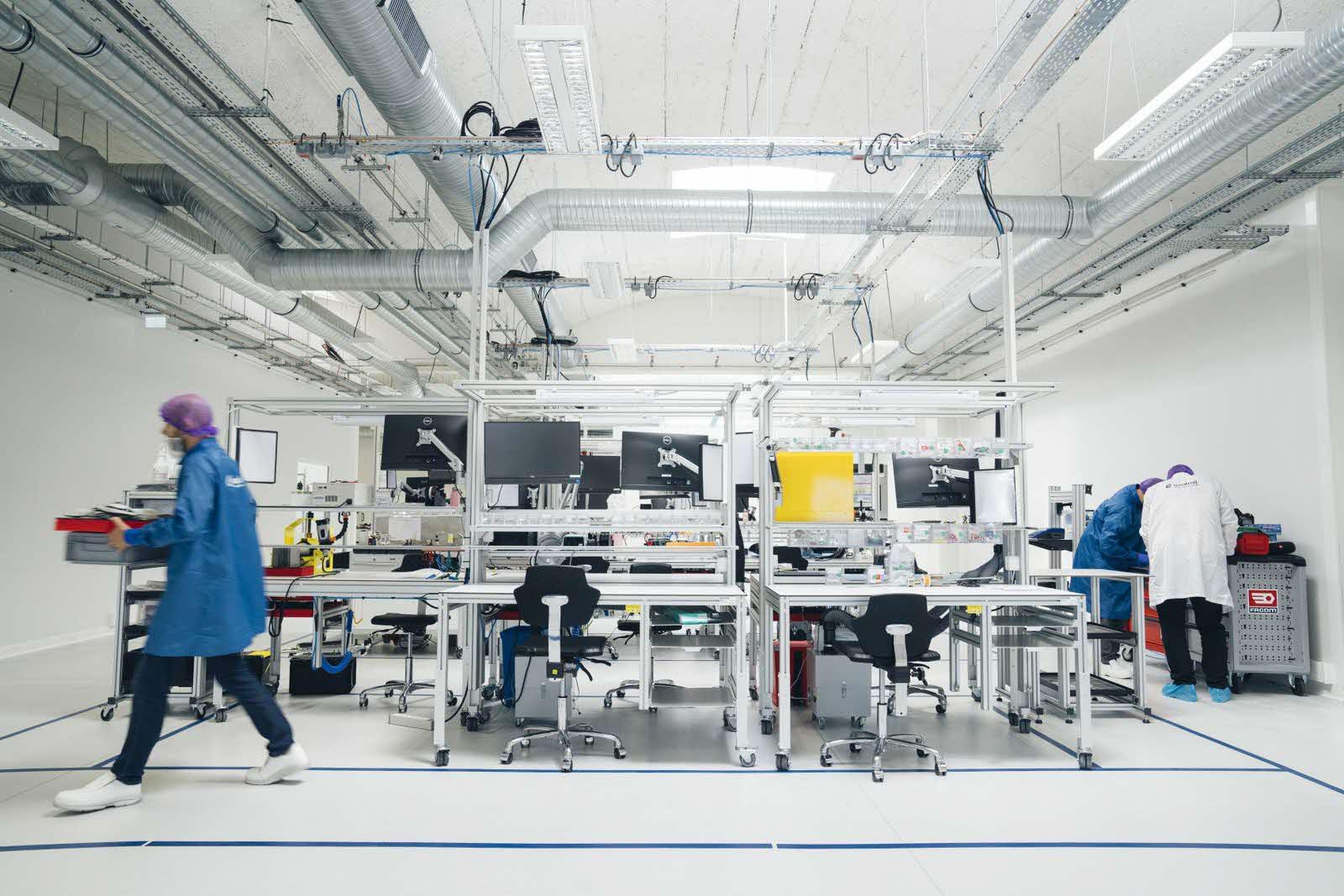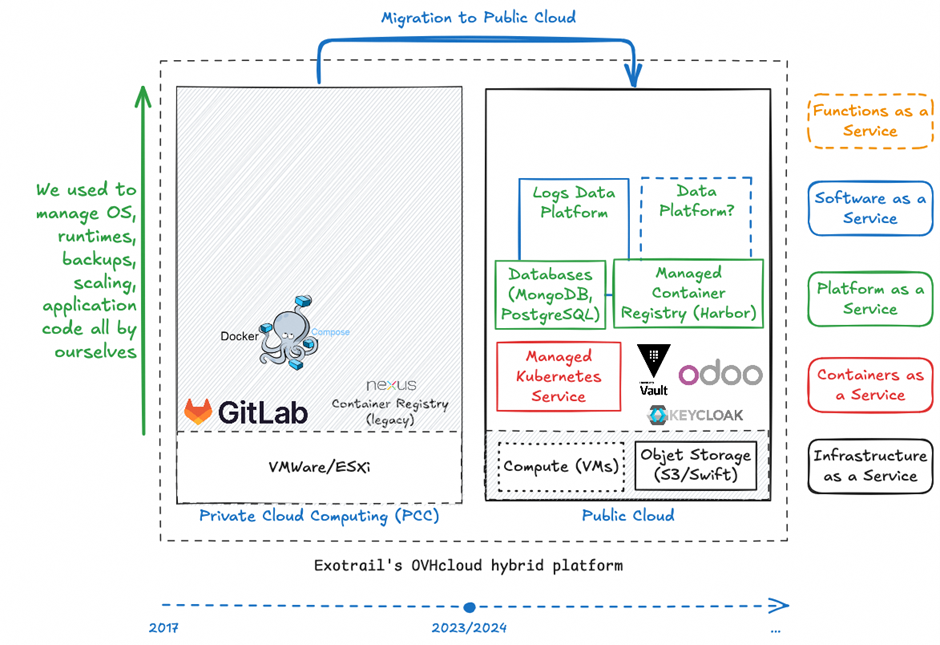Spacetech firm Exotrail supercharges scalability with OVHcloud’s Public and Private Cloud
OVHcloud & Exotrail


Flexibility and scalability with cost control built in

Sovereign and secure multi-cloud environment

Time saving via OVHcloud open-source PaaS solutions
The context
Exotrail is a space service company founded in Massy, Ile-de-France in 2017. The company produces electric propulsion systems, called spaceware™, used in small satellites (smallsats). It also develops an Orbital Transfer Vehicle (OTV) – or spacevan™ – for smallsats. An OTV is a type of space vehicle designed to move another spacecraft from one orbit to another. This particularly helps to solve the ‘last mile problem’ – the final step of a satellite's journey, when it is released by the rocket for its final orbit. Most notably, it means the hosted satellite does not have to consume its own fuel for this step. Other applications for in-orbit services may include moving faulty satellites to an intermediate orbit, extending the life of a satellite that has exhausted its propellant or moving space waste etc.
Exotrail also develops software tools for space simulation and operations, supporting the space ‘supply chain’ and tools for space logistics. As of 2025, Exotrail had conducted more than 20 missions in space.
The challenge
Some of the Exotrail team had used OVHcloud’s infrastructure in previous roles, and after founding the company, applied to join OVHcloud’s startup programme. The team was accepted, and established the business’s early infrastructure on VMware ESXi, managing a comprehensive set of virtual machines with backups handled via Veeam.
“We wanted to build something long-lasting and Private Cloud was perfect for this,” said Benjamin Auger, Head of IT, Exotrail. “OVHcloud’s Managed Kubernetes Service wasn’t launched until 2019, so at the start of the relationship, we focused on using Hosted Private Cloud. The cost management side was good and we could predict our pricing fairly easily. The stack was reliable, and we could manage all of the infrastructure without too much trouble.”
Sovereignty was also important for Exotrail’s technology considerations. The space sector often falls within defense and military regulations, so navigating the legal aspects of spacetech can be complicated.
“We carried out a risk analysis early on, as well as thinking about the philosophical and legal implications,” continued Auger. “We were especially careful of the International Traffic Arm Regulation, which is a US regulation that could limit or control how our IP could be shared outside of America. As a startup, we wanted to make sure we could export and re-export both our hardware and software globally, whilst still respecting local laws. Some of the US hyperscalers were very free with their cloud vouchers, but our risk analysis told us that working with them would ultimately limit our freedom.”
The first five years of Exotrail’s business were focused on scaling the company and building a robust IT foundation. Hosted Private Cloud represented most of Exotrail’s computing resources, although there were a few services hosted within other cloud providers or accessed via direct SaaS solutions.
However, as the company grew, the team was keen to shift their focus and make delivery faster, smarter, and more accurate by optimising services, exploiting data, and embracing elastic, cloud-native architectures. Furthermore, Exotrail had started to develop a number of software tools that they wanted to sell to other businesses. As a result, they began to look at OVHcloud’s Public Cloud offering to see how it could help the company scale faster and more efficiently without compromising on sovereignty or security.
“We began a deep transformation to meet growing demands for speed, scalability and efficiency,” commented Auger. “It started with a mindset shift, placing automation, standardisation, and a product-centric culture at the core. From there, we designed the next generation of our cloud infrastructure to support the company’s ambitions for the next five years.”
The solution
The Exotrail team decided to adopt a hybrid model, leveraging the best of both worlds: their existing Private Cloud and new Public Cloud infrastructure, interconnected through OVHcloud’s internal network (vRack). This was ‘evolution rather than revolution’ and helped to extend existing private infrastructure with managed Kubernetes and cloud services to gain agility without increasing the size of the team.
This was important because Exotrail’s core IT team consists of six people, so although they initially considered a straightforward Kubernetes environment, this would have incurred a considerable management overhead. As such, they started to look at OVHcloud’s Managed Kubernetes Solution.
“We’re always focused on agility, but constantly have to balance investments with benefits,” Auger added. “We’d definitely prefer to have managed backups and databases ourselves, but the time-saving and business benefits don’t currently outweigh the costs.”
Exotrail has a variety of data applications hosted in databases with OVHcloud, as well as a significant amount of sensor data from its in-production systems.
Before migrating any workload to OVHcloud, the Exotrail team carefully formalises their requirements for a secure and scalable ‘landing zone’, which is the foundational cloud environment enabling Exotrail to confidently deploy and scale its workloads.
Security and identity control is very important to Exotrail, and the landing zone model is designed to ensure strong identity management, streamlined access control with coarse-grained IAM policies, and clear resource organisation by team and environment to promote both security and operational efficiency. The team is also highly focused on creating long-term value, and places strong emphasis on Infrastructure as Code practices for repeatable, automated deployments, establishing robust network connectivity to allow seamless, secure communication between projects and with legacy environments.
“It was important to us that we could balance high availability without compromising on latency,” continued Auger. “We have a data warehouse with a billion rows that we host in Managed Kubernetes Services because it’s fast and cost-effective, but at some stage we’d like to look at a managed data warehouse if the price is right.”
As a result, Exotrail expanded its infrastructure stack with OVHcloud to consist of:
- Managed Hosted Private Cloud (VMware/ESXi)
- Managed Kubernetes Service (Kubernetes, OpenStack)
- Managed Container Registry (Harbor)
- Managed databases (PostgreSQL, MongoDB)
- Object Storage (S3, swift)
- Log Data Platform (Graylog, OpenSearch)

The result
With OVHcloud, Exotrail continues to optimise its resource consumption and has a highly agile microservices infrastructure.
Exotrail has now successfully transitioned to a cloud-native architecture by implementing a scalable flight dynamics computation platform using Knative on Kubernetes. This shift has allowed their engineers to focus on developing flight dynamics features with stateless functions. This has improved testability and also reduced maintenance costs through managed services.
The team has also optimised resource consumption and achieved continuous delivery with tools like Argo Rollouts and Knative. There were minor challenges with OVHcloud's dynamic cluster autoscaling, which will be addressed in the future when OVHcloud adds Karpenter (Kubernetes node auto-scaling) support. However, the move to Public Cloud, combined with adopting cloud-native practices, has significantly enhanced the company’s flexibility and scalability.
Embracing OVHcloud’s Public Cloud infrastructure has also enabled Exotrail to evolve its ERP system. The organisation has always used Odoo as its ERP system, initially starting with a simple installation of the Odoo binary on a VM within the Hosted Private Cloud environment. The team then transitioned to a containerised installation via Docker Compose, followed by a self-managed Kubernetes distribution, and ultimately to a deployment in OVHcloud's Managed Kubernetes Service (MKS).
This progression has enabled the company to leverage the scalability and elasticity of the Public Cloud platform. Consequently, the team can now focus exclusively on configuring Odoo and managing its data without the need to maintain the orchestration layer. This shift has significantly reduced the company’s ‘time to release’.
“It’s been an absolute pleasure working with such a visionary technology team,” added Melissa Combettes, Cloud Account Manager, OVHcloud. “We’ve grown together, and it’s very rewarding to see Exotrail’s business growth being accelerated by our cloud infrastructure. Most people probably don’t realise that the future of the space and satellite industry is managed by databases and ERP software, but we’re very proud to play our part and support this amazing business.”
Finally, Exotrail is now using OVHcloud’s Logs Data Platform PaaS solution for centralised log management. Historically, the team had found that self-managed solutions based on an open-source stack like ELK or Graylog were difficult to set up and maintain, especially for a small team.
By moving to the OVHcloud Logs Data Platform managed solution, the team benefits from a ready-to-use, open-source, well-documented tool which allows them to focus on their core roles rather than administration. With a degree of automation and standard integrations, Exotrail was able to rapidly set up and ingest terabytes of logs within a few days. Once this had been done, the team used the powerful query language to build highly customised, real-time dashboards, enabling a high degree of observability.
“One of the most positive experiences we've had is the close collaboration with the OVHcloud teams, including platform engineers, cloud specialists, data engineers and sales managers. We really enjoy working with them and appreciated being able to contribute directly to shaping the product through ongoing discussions and feedback. The OVHcloud Community has also been incredibly valuable, active, supportive, and full of expertise. While things don't always work perfectly and issues can arise, we've always managed to de-risk the situation and find a solution, thanks to the responsiveness of the teams."
Benjamin Auger - Head of IT, Exotrail


